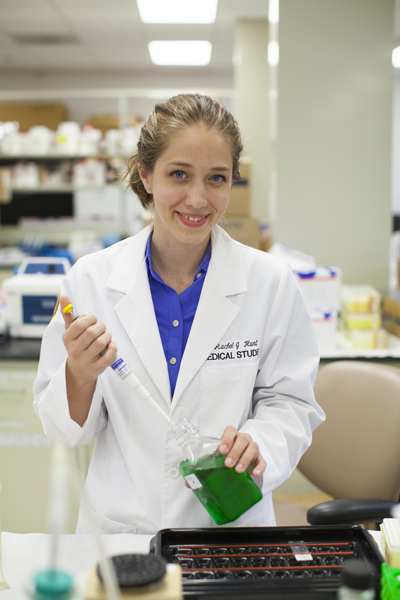
Written by Kelli M. Titus

Rachel Hunt, an M.D. candidate at Oakland University William Beaumont School of Medicine, is contributing to research on Alzheimer's disease as part of her capstone project.
Oakland University’s School of Medicine partners with Beaumont Health System to nurture aspiring doctors of medicine through academics, hands-on clinical training and cutting-edge research.
One such research program is the capstone, requiring all students to participate in faculty-mentored scholarly projects.
“Capstone provides us with the opportunity to get involved in research early in our careers, with support and guidance from our school,” said Rachel Hunt, an M.D. candidate at OUWB. “We get to explore areas we are interested in and develop vital research skills.”
Fascinated by neuroscience, Hunt participated in Alzheimer’s research conducted by Beaumont researchers for her capstone project: “Radiation Therapy for Alzheimer’s Disease: Influence on Beta Amyloid and Synaptophysin expression.”
“Alzheimer’s disease (AD) is a progressive, debilitating, incurable neurological disease for which limited treatment currently exists,” Hunt wrote. “The pathophysiology of AD is linked to the build up of beta amyloid in the brain.”
Beta amyloid is a protein that can clump into plaques, killing nerve cells and leading to AD. Beaumont researchers have been studying the effect of radiation therapy on Alzheimer’s for several years, allowing Hunt to assist in their endeavors by analyzing cellular markers and looking for beta amyloid buildup on slides of stained brain tissue.
A stain is added to the tissue, one that targets the beta amyloid protein, allowing researchers to view how much of the protein is present in the brain after it has undergone radiation therapy. The slides depicted that radiation therapy significantly decreased the build up of beta amyloid in the brain tissue, which can be correlated with improved memory functioning in AD patients.
Hunt also examined how radiation affects the brain’s synaptophysin, a protein that detects areas of synapsis, which aids in directing brain signals. The research identified greater synapsis, suggesting that the therapy increases brain function.
“I love the clinical work, but this was really fun,” Hunt said about her first time conducting lab research. “Not only did I learn a lot, but it felt good being able to contribute to the fund of scientific knowledge.”
Although Hunt’s time in the lab ended with the conclusion of her capstone project earlier this month, Beaumont researchers will continue their studies to uncover the specific mechanism which radiation therapy effects in AD.
“The close ties that Oakland has with Beaumont Health System gives us opportunities to participate in larger research projects with experienced physicians and scientists.” Hunt said.
OUWB School of Medicine is consistently encouraging students to explore original research opportunities that extend beyond the laboratory to all disciplines that impact the health of patients and their communities.